Play began on April 23rd with Slovenia dominating Japan by a score of 7-1, led by team captain Jan Urbas, who scored twice and had three assists. In goal for Japan was former Los Angeles Kings goaltender Yutaka Fukufuji. Miha Verlic also had two goals and two assists for Slovenia.
Italy opened their tournament with a 3-1 win over host Poland after scoring a goal in each period.
The third game saw Austria fall behind South Korea 2-0 after two periods but then fight back with a by Markus Schlacher and Konstantin Komarek, the latter coming with 3:55 to play. Regulation ended in a tie and overtime passed without a winner before the game moved to a shootout. Komarek scored in the first round for Austria and none of the remaining three shooters were able to score, giving the Austrians a 3-2 win and 2 points in the standings.
On April 24th, Slovenia remained on top of the standings with 6 points after defeating Italy 3-1. South Korea beat Poland 4-1 and Austria stayed in the hunt with a 3-1 win over Japan.
After a day off, play resumed on Tuesday the 26th as South Korea beat Japan 3-0 behind 29 saves by Matt Dalton, a Canadian who obtained South Korean citizenship a month ago and one of a half dozen North American-born players who compete in the Asia Hockey League who are on the South Korean roster. The win for South Korea was their first ever win over Japan, dating back to their first meeting, a 25-0 win for Japan 34 years ago.
Austria won again, defeating the Italians 4-2 and Poland upset the first place Slovenians 4-1 to give the home fans their first victory to celebrate. This left the standings after three games at Austria leading with 8 points, South Korea at 7 and Slovenia still in the running at 6. Italy and Poland were tied at 3 with Japan trailing with 0 and now relegated to Division I Group B for 2017.
Play on Wednesday the 27th began with Italy winning 3-0 against the Japanese to keep the Italian medal hopes alive. In a crucial match, third place Slovenia dominated second place South Korea in a 5-1 romp, led by Anze Kuralt's goal and two assists.
The defeat of South Korea gave Austria an opening to secure a medal, but it was not to be, as Grzegorz Pasiut's goal at 12:34 of the first period stood up behind goaltender Przemyslaw Odrobny's 29 saves to shut out the favored Austrians 1-0.
This turn of events left the standings all bunched up going into the last day, with Slovenia leading with 9 points and a strong goal differential of +9. Austria was second one point back with 8 at +4 while South Korea was still in it with a shot at gold with 7 points. Italy and Poland were tied at 6 points with Italy at even in goal differential and Poland at -1. Japan was still winless and a zero points.
The first game of the final day, yesterday, saw South Korea needing a victory in regulation to have a chance at the title. It was not to be however, as Italy scored a power play goal 2:38 into the game and then added a second 4:35 into the third period for a 2-0 lead. Then things got interesting, as 31 seconds later Michael Swift was sent off for South Korea only to have Thomas Larkin of Italy get called for tripping 44 seconds later. With the faceoff down in the Italy end and down by 2 goals, the South Koreans pulled goaltender Dalton for a 5-on-4 advantage. It would take Eric Regan 23 seconds to capitalize with assists from Wonjun Kim and Kisung Kim to make the score 2-1 with 3:47 to play. Italy held strong, including the last 25 seconds while down a man and with Dalton pulled again for a 6-on-4 South Korean advantage. The three points from the regulation win gave Italy 9 points and a momentary share of first place.
The day's second game saw Slovenia taking on Austria with the winner now sure to earn the promotion to the Top Division for 2017 thanks to South Korea's loss. The first blow was struck by Austria at 5:49 when Komarek scored with Kuralt in the box for Slovenia. A little over five minutes later Slovenia tied the game on a goal by Robert Sabolic.
The game turned in the second period when Alexander Pallestrang for Austria was called for checking to the head and given a major. It would take nearly the entire five minutes, but with just 12 seconds left in their advantage, Slovenia got a goal from Ken Ograjensek at 7:29 to take a 2-1 lead.
During the third period, Austria would kill off two penalties followed by Slovenia surviving a shorthanded situation of their own. Finally with 1:24 to play, Austria pulled goaltender Bernhard Starkbaum for an extra attacker. Then Verlic was called for boarding with 50 seconds to play, giving Austria a final 6-on-4 advantage, but they failed to convert and Slovenia held on for a 2-1 regulation victory.
The final game of the schedule saw fifth place Poland taking on sixth and last place Japan. Poland romped to a 6-1 first period lead and extended that to a final 10-4 win with nine different players scoring for the Poles. So close were the standings that Poland leapt from fifth to third in the final rankings, no doubt pleasing the home fans with bronze medals.
Italy was classified second, tied with Poland with 9 points but earned the silver thanks to their 3-1 head to head win over the Poles. Italy may still be promoted to the 2017 Top Division, but must wait for the final results of the upcoming 2016 World Championships in Russia. Their promotion is dependent on the fate of both Germany and France, co-hosts for the 2017 World Championships. If France and Germany finish in positions 7 and 8 in Group B in Russia, their places in 2017 are protected by being the co-hosts and only one team from the 2016 Worlds will be relegated, which would leave Italy in Division I Group A for 2017.
Austria had gotten off to a strong start with wins over South Korea, Japan and Italy, but a 1-0 loss to Poland and yesterday's 2-1 defeat by Slovenia suddenly saw the Austrians go from leading the standings after 3 games to finishing without a medal in the final classification. South Korea fared well, winning 4-2 over the host Poland and defeating Japan for the first time in their history by a score of 3-0 and an even goal differential for the tournament. Japan trailed the pack at 0-5 and are relegated to Division I Group B for 2017 and will be replaced by newly promoted Ukraine.
Today's featured jersey is a 2014 Slovenia National Team Anze Kopitar jersey as worn during the 2014 Olympics in Sochi, Russia. Up until the 2014 Olympic Games, Slovenia wore blue jerseys trimmed in red in the colors of the Slovenian flag.
Their national football club had begun wearing green kits as far back as 1994, which are the traditional colors of the capital city of Ljubljana, which has a green dragon perched on a white castle atop green hills on it's coat of arms, which is placed on a half white, half green field for the city flag.
Additionally, those colors were used by NK Olimpija, the most successful club team at the time, which is based in Ljubljana.
The national hockey team continued to wear blue jerseys accented with red and white through the 2013 World Championships before debuting their new blue and green jerseys for the 2014 Olympics, which caused quite a stir, as the shade of green was a very modern electric shade of green and nothing like the traditional primary colors that essentially every other nation uses.
As a former member of Yugoslavia, which endured a horrible war in the aftermath of the breakup of that former communist nation, perhaps some of the motivation for Slovenia originally changing the national soccer team colors was to differentiate themselves from other former Yugoslavian members Croatia and particularly Serbia, who also wear red, white and blue colors.
Today's featured jersey is a 2006 Slovenia National Team Anze Kopitar jersey as worn during the 2006 World Championships in Riga, Latvia when Slovenia was still using the blue, white and red colors of their national flag.
Slovenia first began play as an independent nation in 1993 in Pool C. They earned promotion to Pool B in 1997. When the IIHF restructured their ladder system for 2001, Slovenia was placed in Division I Group B, which they immediately won, earning their first spot in the Top Division for 2002. Their story has since been one of promotion and relegation, as they have bounced back and forth between Division I and the Top Division 11 times in the last 15 years as they look to secure a permanent place in the Top Division.
Slovenia had never qualified for the Olympics prior to 2014 and were not guaranteed a spot based on their world rankings. They were placed in Group F in the Olympic Qualifying process and won their group over Belarus, Denmark and Ukraine. Slovenia were ranked 17th in the world and it was a shock that they advanced to the Olympics despite being ranked lower than Germany (10th), Denmark (12), France (13), Belarus (14) and Kazakhstan (16). In Group F, they opened with a 4-2 win over Belarus before a key 2-1 win over hosts Denmark. They then dominated Ukraine 6-1 to secure their place in the Olympics.
After one more season in with Södertälje Kopitar has now completed his tenth season with Los Angeles, which includes leading the team in scoring seven times, being named their most popular player twice and their best defensive player four times - all four coming during a season that he also led the club in scoring!
He also became the first Slovenian to win the Stanley Cup in 2012 and is easily the most accomplished Slovenian player of all time. He is now approaching 250 NHL goals, currently at 243 and has appeared in three NHL All-Star Games.
Internationally, Kopitar has skated for Slovenia three times each at the U18 World Championships and U20 World Championships and four times at the IIHF World Championships as well as at Slovenia's first Olympics in 2014.

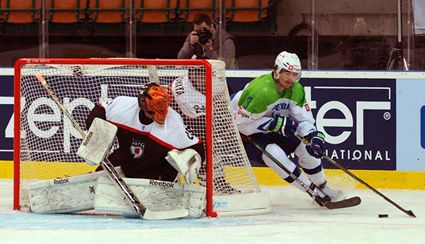
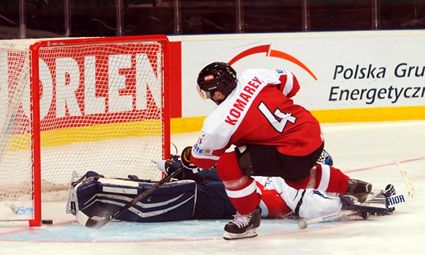
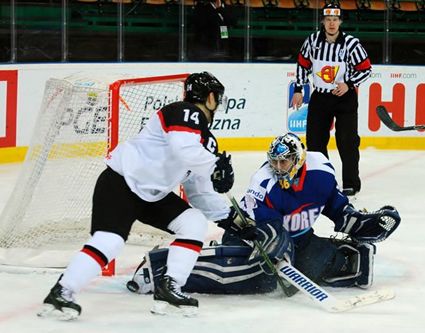
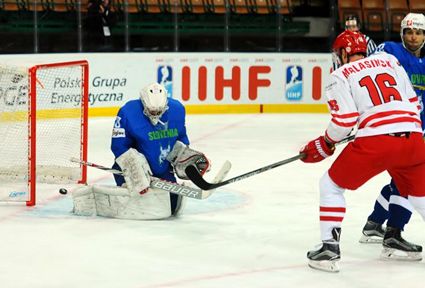
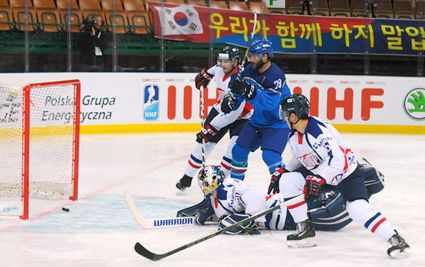
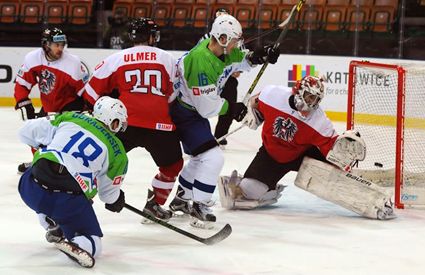
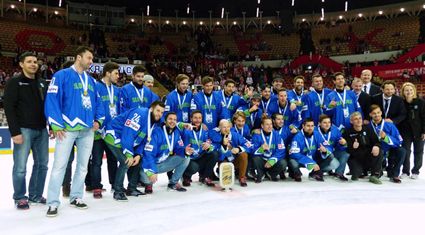
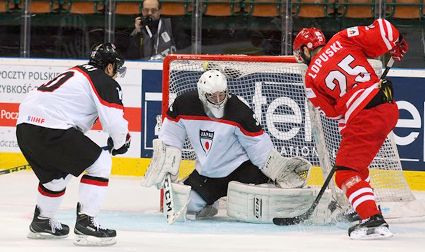
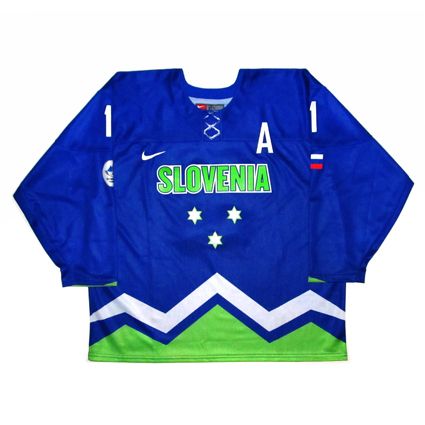
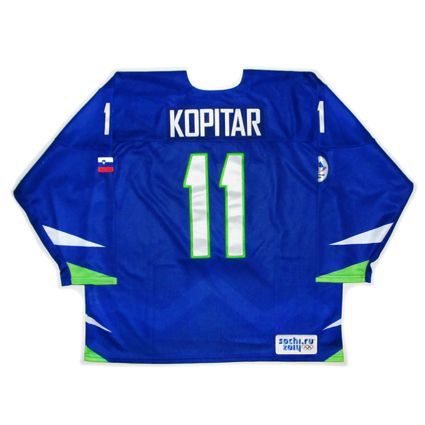
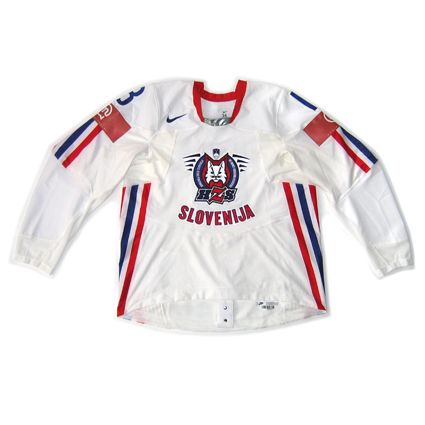
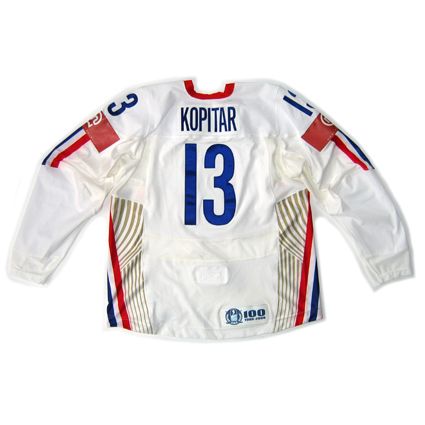










No comments:
Post a Comment
We welcome and encourage genuine comments and corrections from our readers. Please no spam. It will not be approved and never seen.